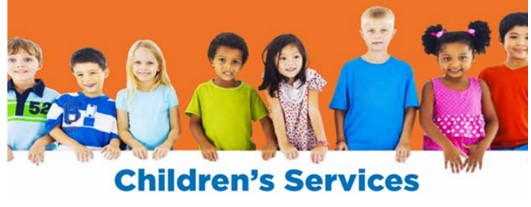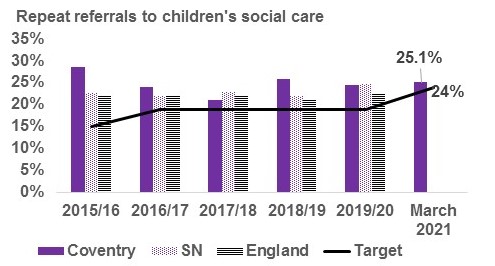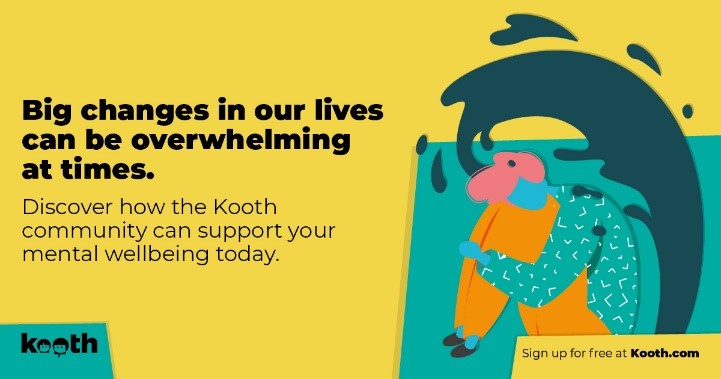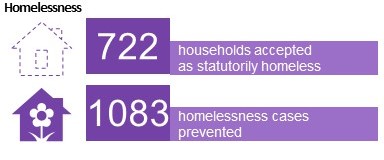Protecting our most vulnerable people
The Council helps to keep children and adults safe from harm; provide early intervention for families; and prevent homelessness, while services continue to face significant and sustained pressures.
Breastfeeding
In 2019/20, 94.6% of Coventry infants’ breastfeeding status were known. Public Health England (PHE) requires the figure to be 95% or above before reporting, and so the Coventry’s figures were not published. Of Coventry infants whose breastfeeding status was known in 2019/20, 50% were totally or partially breastfed at 6-8 weeks after birth. This is an increase from 2018/19 rates of 48%. Compared to England’s rate of 48% in 2019/20, Coventry’s is significantly higher.
The city has adopted the UNICEF baby friendly initiative infant training programme. All of the service’s staff, excluding school nurses, have attended relevant training; and audits have been carried out with staff and service users in preparation for the pending UNICEF re-accreditation assessment.
The pandemic-related restrictions meant that, for a portion of 2020/21, face-to-face contact and home visits were not allowed. It was originally estimated that the restrictions would decrease breastfeeding levels, so the service aimed to protect breastfeeding levels – as well as ensure that infant formula was available.
The service received a great increase in the number of calls for support by anxious families in response to pregnancy in lockdown, breastfeeding and queries about the safety of the Covid-19 vaccination. Families have also reported feeling isolated, lonely, and vulnerable; and have raised concerns about their own mental health or that of their family members. In response to restrictions and increased demand, the service adapted, increasing virtual contact. Families in Coventry can now access the service via Zoom breastfeeding cafes and virtual specialist clinics. In addition, Covid-safe face-to-face clinic consultations were carried out in family hubs once restrictions relaxed.
Provisional data for the first three quarters of 2020/21 suggest that, of the Coventry infants whose breastfeeding status was known, 51% were totally or partially breastfed at 6-8 weeks after birth – maintaining the performance level seen in 2019/20. This may reflect well on the new hybrid virtual and face-to-face delivery model; as well as improved collaboration between health visiting and infant feeding teams.
Building on the learning from the pandemic, the service is looking to continue their hybrid offer of virtual and face-to-face support, including monthly infant feeding workshops for all staff; new training for peer support volunteers; a new-style breastfeeding café at a physical venue; and, recognising the mental health concerns reported, a Mindfulness Day.
Update on children's services transformation
The ongoing journey to excellence in children’s services has maintained its momentum throughout the pandemic. Services have embraced system change and adopted digital solutions, to make sure the city’s most vulnerable children are getting the best outcomes.
Despite the lockdown restrictions, recent improvements include:
• redesign of business processes and forms for signs of safety to allow early help for vulnerable children and families before issues become entrenched;
• continued drive to increase the number of internal foster care placements; and
• moving to electronic processes for our residential services, through the implementation of a new module in the children’s case management system.
Supporting families through receiving the right help at the right time
Last July, Coventry's Safeguarding Children Partnership launched its Early Help Strategy for 2020-2022.
The vision is for Coventry children and young people to have supportive families, live safe from harm, fulfil their potential, are healthy, and have positive fulfilling lives.
Increase in the number of looked after children
At the end of March 2021, 747 children were looked after by Coventry City Council. This is an increase of 46 children from March 2020, when there were 701 looked after children. Expressed as a rate per 10,000 children, Coventry’s rate has increased from 88.0 March 2020 to 93.7 in March 2021.
There was a considerable increase in new children becoming looked after in July and December 2020 – and the number of looked after children peaked at 754 in December 2020. Trends in Coventry reflect wider trends regionally and nationally and may be linked to increased isolation associated with pandemic-related lockdowns.
A total of 304 new looked after children started during 2020/21; the highest number between 2015/16 to 2020/21.
Coventry is launching the Family Valued model in April 2021, a model of system change where training in restorative practice is provided across children's services and partner agencies, with one of the aims of improving outcomes in Coventry by reducing the number of children looked after.
Increase in repeat referrals to children’s social care
Repeat referrals to children’s social care have increased slightly from 24.6% in 2019/20 to 25.1% at March 2021. Throughout the year a responsive ‘dip-sampling’ approach has been employed to help social workers and managers understand the reasons behind the re-referrals, so that actions can be put in place to support improvement and further reduce re-referrals moving forward into the new financial year.
Fewer looked after children previously looked after
The percentage of new looked after children who were previously looked after has reduced to 5.6% in 2020/21, from 7.7% in 2019/20. The excellent performance in reducing the numbers of children returned to being looked after is evidence that outcomes for vulnerable and at-risk children are improving in the city.
Digital counselling and support to improve the mental wellbeing of children and young people
Kooth, a new anonymous digital counselling and support service for children and young people went live in Coventry in April 2021.
Kooth is a safe, free, and confidential way for young people to access emotional wellbeing and early intervention mental health support. The service, funded by Councils and the clinical commissioning group, is open to all young people in Coventry and Warwickshire aged 11-25 years.
Up to 70% off water bills for care leavers
In an industry-first, Severn Trent, the water company, is offering up to 70% discount on water bills for care leavers. This helps provide financial support to care leavers as they move into independent living; and is part of the care leavers covenant, a commitment by local authorities to help support young adults leaving the care system. Severn Trent is the first utility company to join forces with a local authority, in offering this type of support to care leavers. The scheme will give the care leavers up to 70% off their water bill in the first year, and then further discounts until the age of 25.
Adult social care
When the pandemic commenced, adult social care adapted quickly to continue to deliver most of our responsibilities for assessment and safeguarding through digital means while ensuring we continued to undertake face to face work where this was required. As we progress towards recovery from the pandemic, we will increasingly blend the use of technology with face to face work. We did, however, have significant challenges in respect of care capacity and were one of only six local authorities to activate the Care Act easements due to a shortage of care and support staff early in the pandemic. This required us to temporarily reduce our approach to promoting independence and reassign staff from day centre activity to other services.
Stable number of people in receipt of long-term care
As of 31 March 2021, there were 3,404 people receiving long-term ongoing support from adult social care. The number and rate have stayed at a similar level over the last 5 years and remain lower than comparators.
Fewer new people asking for support from adult social care
In 2020/21, 9,870 adults (a rate of 3,383 per 100,000) contacted social care who had not previously received social care support. This is a reduction of 6% from 2019/20, when 10,367 adults (3,600 per 100,000) requested help.
The number of adult safeguarding S42 enquiries (476 enquiries) and rate per 100,000 population (163 per 100,000) have both fallen in comparison with last year.
96% of service users placed in adequate social care services
The proportion of adult social care service users placed in regulated adult social care services rated as inadequate has reduced to 3.7%. As of 31 March 2021, 30 people were placed in residential and nursing care within the city that were rated by the Care Quality Commission (CQC) as inadequate, out of 810 people placed. Where a service is rated as inadequate following CQC inspection, adult social care ensures that residents continue to have their care and support needs met and work with the home to ensure remedial actions are put in place.

Satisfaction measures not available this year
The adult social care survey was paused in 2020/21. This means that data on the proportion of adult social care service users who feel safe; and the overall satisfaction of people who use services with their care and support is not available. We did however undertake a smaller survey of our own, which although was not statistically significant did indicate a high level of satisfaction with the support received from those who responded.
The carers survey has also been paused – so overall satisfaction of carers with social services is also unavailable.
Impact of the pandemic on the care sector
The impact of the pandemic on the care sector and care homes in particular is well reported and Coventry has not been immune from this impact.
The Council has worked with the care sector in Coventry throughout the pandemic supporting with ensuring adequate personal protective equipment (PPE) was in place and additional funding to support infection control, testing and workforce resilience was provided. We have also been supporting the care sector with the roll-out of Covid-19 vaccinations to care staff. As of 29 June 2021, 80% of frontline care staff have received the first dose of the vaccination, and 66% with both doses.
A full report setting out the performance of adult social care against objectives set can be found in the local account, available at https://www.coventry.gov.uk/localaccount/.
Housing and homelessness
Less statutory homeless (in priority need) households
The number of households accepted as statutory homeless (in priority need) decreased from 913 in 2019/20 to 722 in 2020/21. However, this is still a significant increase from 388 in 2018/19. The past year has seen an increase in approaches to the service particularly from single people. Like many services, the delivery of the front-line statutory service moved to a telephone-only service at the outset of the first lockdown on 23 March 2020. There has also been a year-on-year increase in approaches to the service:
• 2018/19: 3,789 approaches
• 2019/20: 4,530 approaches
• 2020/21: 4,497 approaches
With the eviction ban due to expire, the service expects an increase in approaches, especially from families, in 2021/22.
More homelessness cases prevented and relieved
The number of homelessness cases prevented and relieved increased from 552 in 2019/20 to 1,083 in 2020/21 against a corporate target of 750. The front-line processes were reviewed, and changes made to how customers can access the service.
The introduction of appointments has seen an increase in cases going onto prevention; giving more opportunity to work with customers to resolve their circumstances before they become homeless.
Temporary/supported accommodation
The Council delivered a number of significant projects during 2020/21, reducing the spend on temporary accommodation. Projects include:
• implementing a temporary accommodation charging policy;
• re-negotiating the costs of temporary accommodation, securing better accommodation at cheaper cost; and
• no family was placed in B&B accommodation in 2020/21, except in an out of hours emergency;
• the implementation of an agreement with Cornerstone Partnership and Let’s Rent Coventry, the Council’s rent guarantee scheme, increasing the number of private rented properties at local housing allowance rates for homeless households;
• approval to purchase a range of temporary accommodation, a number of which are now refurbished and providing enhanced support to single people. This includes the conversion of a former student accommodation block, a 26-bed unit on Holyhead Road that opened in March 2021; and
• newly commissioned housing-related support contracts, which went live in April 2020.
Below: new accommodation secured to support single homeless people (image source: Google Maps)
Supporting rough sleepers
In March 2020, at the outset of the first national lockdown, the Government issued a directive for Councils to accommodate all people rough sleeping in their boroughs. In Coventry, this coincided with an increase in the city’s rough sleepers team from three officers to nine officers. Working with partners across the city, in particular the Salvation Army, the team accommodated over 350 individuals temporarily and moved over 250 into permanent accommodation. Working with partners, the Council also secured over three million pounds in funding to meet the accommodation needs of rough sleepers in the city. Launched in February 2020, Change into Action is an alternative giving scheme supporting local specialist charities and street teams working to change the circumstances of rough sleepers and those at risk of rough sleeping in Coventry. Next year, the Council will be refreshing the city’s rough sleeping strategy with local experts by experience and working towards our ambition to eliminate rough sleeping in 2022.











